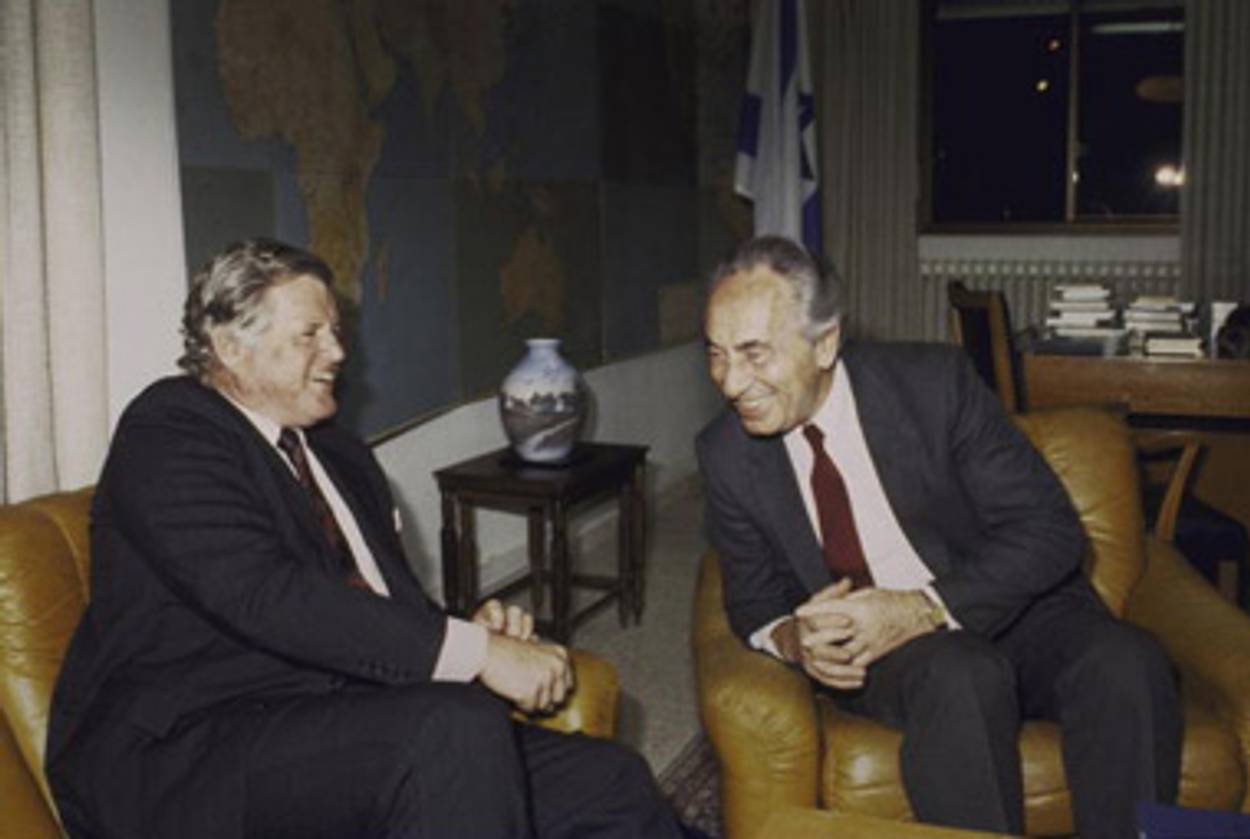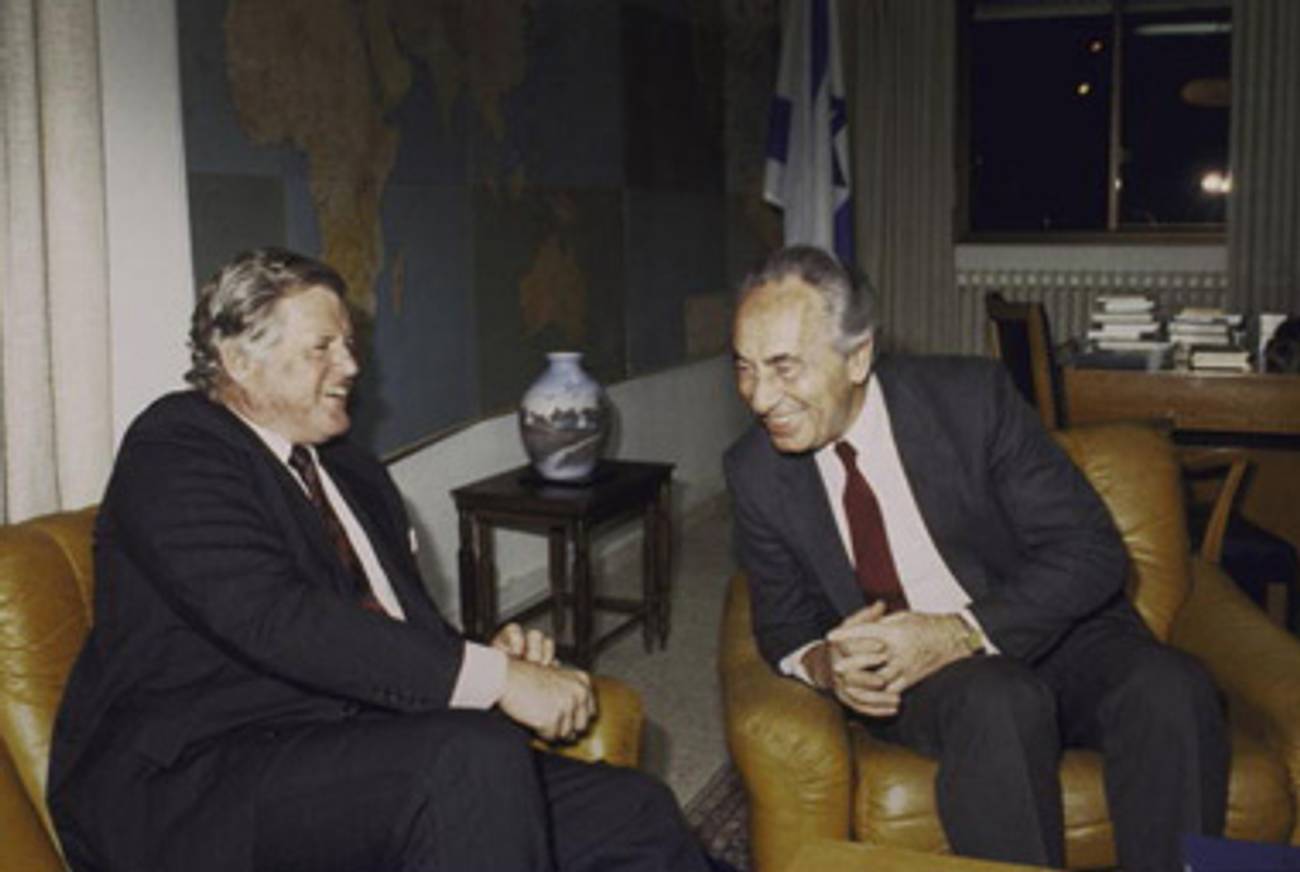Mishpacha
Ted Kennedy—friend of Israel, champion of social justice, advocate for Soviet Jews—became part of our family




It was the spring of 1980, and Ted Kennedy was running for the Democratic nomination for president and stumping in Livingston, New Jersey. A woman in the audience asked what he could do for her family—Jews, she explained, stuck in Iran after the revolution, without visas. The senator promised to help. He went on to concede the nomination to President Jimmy Carter, return to Washington, give up his presidential dreams. But he delivered. “It took a few months, long after the presidential campaign had ended and the senator was no longer seeking the votes of people in New Jersey,” longtime Democratic operative Susan Estrich, then a Kennedy staffer, recalled in her syndicated column just after Kennedy was diagnosed with a brain tumor last spring. “But we got visas for that family.”
Ten years later, on March 28, 1990, a Boston Globe dispatch filed from Moscow noted that Kennedy, though having spent nearly two decades pushing Soviet leaders to address and ameliorate the plight of Soviet Jews, was still sufficiently chummy with Mikhail Gorbachev that Pravda called him “an old friend” of the premier’s.
“On both particularist and universalist agendas, there was no more eloquent, indeed no more tenacious fighter than Kennedy,” Rabbi David Saperstein, the director of the Religious Action Center of Reform Judaism, the movement’s Washington-based social-justice organization, told me yesterday morning, echoing eulogies that poured in from nearly every Jewish corner when the sad news came from Hyannis Port that the senator had died overnight at 77 years old. “There was a strong, lasting and unbreakable bond between Kennedy and vast majority of American Jewry.”
It wasn’t an inevitable bond. Ted Kennedy was the youngest son of one of the most rabid isolationists of an isolationist moment, an old-school anti-Semite in the mold of Father Coughlin. In Joseph Kennedy Sr.’s time, it was acceptable, indeed expected, to find Jews distasteful, to put it mildly. The senior Kennedy was an icon for that era, and he mingled among the greatest Jew-haters—Charles Lindbergh, Coughlin—in a period in which such men and women flourished.
But Joe’s sons rebelled against that anti-Semitism. Indeed, by the time John Kennedy won the presidency, in 1960, the Kennedys had found a common minority link with Jews. The election of the first Catholic president was a reflection of religious equality and equity in America, an early victory in the civil-rights battles whose greatest accomplishments were to come. The realization of the America as we wanted it to be—truly religiously tolerant—was a welcome change for Jews. The Kennedys and the Jews emerged as stalwarts of an established progressive caucus. The shift reflected a larger movement toward a declining tolerance of cultural anti-Semitism in the transition from pre-war to post-war generations.
Maybe it wouldn’t have been Ted to cement that bond, if his brothers had lived. But he took the mantle of philo-Semitism up as though it was his idea from the outset.
“Kennedy, although not of the World War II generation exactly, was from the Hubert Humphrey-Alan Cranston school of liberals who were passionately pro-Israel, partially because the World War II vets among them had witnessed the Holocaust,” Gil Troy, a professor of history at McGill University and a visiting scholar at the Bipartisan Policy Center, said by email yesterday. “Kennedy’s consistent support for Israel, along with his support for Soviet Jewry were givens, not in the sense of being taken for granted, but in the sense of being so central to his identity and worldview, it was assumed. Moreover, there was something very healing, very redemptive, for all concerned that Ted Kennedy, the son of that old anti-Semite Joe Kennedy, was such a good friend of the Jews. I don’t know of Ted discussing his father in that context, but Jews were certainly aware of the generational shift—and were grateful.”
Indeed, in the panegyrics pouring down today, many have noted that in Kennedy’s half-century in public office, he was a consistent champion of “Jewish” issues. They cite his unwavering support for Israel, a record of voting with AIPAC 100 percent of the time. (Kennedy aide Tom Dine jumped to the executive director job at AIPAC, a position he held for 13 years.) Kennedy’s Israel position was long perceived as the “best” in Washington and led Jews to support his failed bid for the 1980 Democratic nomination over Jimmy Carter. Most spectacularly, Kennedy stole New York from Carter during the primary season, after the president’s U.N. ambassador, Donald McHenry, supported a unanimous U.N. resolution sharply criticizing Israeli settlements and demanding dismantling of those in existence. (The Carter administration reversed itself two days later, but the damage, at least among Jews, was already done.) And he worked tirelessly for refuseniks from the early 1970s—well before the cause was widely supported—until the fall of the Evil Empire. As late as 1989, he and fellow Senator Paul Simon, were working to expand the U.S. immigration quota for the Soviet Union, so as to allow more Jews into the United States. (That this country still had a quota that served to keep Jews out, half a century after the Holocaust, was remarkable in and of itself.)
But Kennedy’s special relationship to the Jews wasn’t simply about casting a ballot for the Jewish State or pushing to free refusnik families. He became synonymous for the social justice agenda and manifestos that were “Jewish” insofar as, by the mid-1960s, the Jewish community was deeply aligned with the social-justice left. Kennedy and the Jewish activists of the civil-rights movement and the War on Poverty glowed together, reflecting a commonly held set of liberal principles on what is Right and Good. Kennedy carried those values for his entire Senate career. (Given current ambivalence about Israel among many on the political left, coupled with changes in U.S. Jewish identity and political alignment, it can’t be assumed that a similar partnership will readily emerge between the next “liberal lion” and the American Jewish community.)
Kennedy’s liberal crusading made for natural allies among Jews when Jews were best known for their fealty to social justice—and by extension, fealty to the Democratic Party. And, as a living embodiment of both those causes—social justice and the Democratic part—Kennedy himself earned fealty of American Jews. He’ll be missed like a member of the family, because he was.
Sarah Wildman is the author ofPaper Love: Searching for the Girl My Grandfather Left Behind. Her Twitter feed is @sarahawildman.